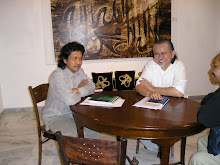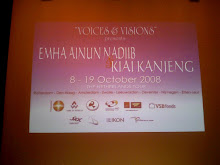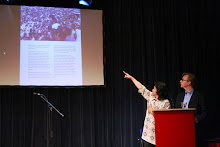On tour with gamelan fusion orchestra Kiai Kanjeng in December 2006, Emha was due to make a closing address in English at the Cultural Forum, the event which was at the heart of the tour. Other prominent Indonesian figures had already spoken. They included former leader of the Muhammadiyah mass Muslim movement, former speaker of the Indonesian parliament, presidential candidate and founder of the PAN political party, Amien Rais. Also present was former rector of the State Islamic Institute, UIN. Both voiced their enthusiasm for and pride for Kiai Kanjeng who were excellent ambassadors for Indonesia during the entire duration of the Cultural Forum. Amien Rais has also on occasion participated in Kenduri Cinta and other events and is well known to Kiai Kanjeng’s regular audiences in Indonesia.
For some time before the event Emha wrestled with the contents of what he was going to say, the context of his comments, the manner in which they would be received and related issues. Eventually he settled on a number of points, nine in all, which addressed the key points of wha the wished to convey. Following is a translation of those comments, which Emha used for the occasion.
1. We come from a situation and from among a people which has long-suffered from division, enmity and separation of one sort or another from one another, to the extent that we dare do nothing else but that which has the potential to bring us all closer together in real unity.
2. We have no wish to add even one drop of bitterness to the tongues of those who have been ostracised by hate, division and the loss of empathy from among people. We come from a people who have suffered a great deal in this way, and so we truly do not dare to utter a single word if it does not in some way include 'love' within it.
3. That conflict arises between groups of people or among nations must be too exciting a proposition, because in all our travels to thousands of venues on the face of this earth, the peace and fellowship among people and peoples that we offer has never interested anybody.
4. Authoritarianism, the abuse of power and injustice often raise their rough and ugly heads, sweeping us up along in their crude paths, recruiting us to new employment as the 'dirt beneath their feet'. Finally, all we have left for the remainder of our lives is a mounting fear that we may find ourselves in the position of exerting power over another, and the horror that we may continue to tread out the path of injustice upon them.
5. A little do we understand about ourselves, a little less do we understand about our country and about this whole wide world we know almost nothing at all. So, wherever we go, we make no judgements about anybody. We're busy, nervously learning about the people we are to meet, because after all the time left to us in our lives is short.
6. We, humanity, are at the apex of our civilisation and perhaps our very existence, we have reached quite literally the 'end of the road'. That social ideology we call 'democracy' can take us not one step further. While we, who live in the far corners of the world have not yet moved towards any ideology apart from one basic principle which enshrines one simple human value: that we fear more than anything causing hurt or pain to any other person or thing.
7. ‘Civilised' humankind, we busy ourselves with discussion, debate even argument over religion, bombings, terrorism as well as every other piece of that rich mosaic of values we call 'knowledge' and 'civilisation'. Yet not one iota have we learned of all of that, and as much as we learn we store it far from our hearts and minds, and so all that WE do here and the only words that may come from OUR mouths here are those that have to do with love and the realisation of the possibility of human warmth and fellowship among people, peoples and with nature.
8. People are so different from one another: their faces, the colours of their skins, the contents of their hearts and minds, their behaviour in life, their ideologies, the socio-political choices they make in their lives, their tastes in culture and the arts and a million other factors. We truly enjoy this condition, because there is not one difference between people that cannot be used to create that which brings us closer together.
9. Knowledge, the 'science' of life, cultural creativity, the application of politics and statehood, the wonders brought to our lives by technology and all forms of human advancement: these have all contributed to disorder in the condition of the world. This has been followed by divisiveness and estrangement among us, costing at times the souls of millions and the destruction of the environment; the natural as well as the built. But because humankind could not possibly have lost every scrap of common sense, wise judgement and clarity of heart, the evolution of our human existence will eventually lead us to rediscover that certain quality whereby we recognise again that we all consist of the same cells, protons-electrons-neutrons and quarks. The study of eco-genetics has begun, and while results are far from complete it is sure to effect a state of union between East and West and between North and South that will be both Real and Secret. And our grand-children will smile in the warmth of the unity among themselves that they will have discovered.
Translated by Ian L. Betts
Saturday, 15 August 2009
Subscribe to:
Post Comments (Atom)


.jpg)





Ian..
ReplyDeleteEnjoyed the blog; now I remember why Ainun moved me so much as I read Detik more than a decade ago. Interesting insights into your own life journey after Surabaya Timur as well.Cheers mate! Greg Redden